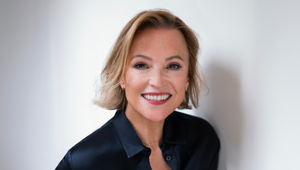
5 Minutes with… Moray MacLennan

If Covid-19 has seen the advertising industry rationalise and engage in some much-needed self-reflection, perhaps there’s no network that’s gone as deep as the M&C Saatchi Group. In January, it announced a new strategy and operating model and some key personnel changes, all carefully planned out to signify a meaningful change after an accounting error hit the headlines in 2019.
That change includes a bigger leadership role for Moray MacLennan, who has been with the agency since day one and is now chief executive of the whole group, worldwide. As the group seeks to build a stronger centre, making it easier to connect talent across different markets and capabilities, there’s a renewed sense of optimism. And, energised by a couple of weeks back in HQ, surrounded by people, life and the buzz of London’s Soho, Moray’s also got a really clear idea about the role that M&C Saatchi and the rest of the advertising industry has in spreading a bit of joy and re-starting the global economy.
While this past year has certainly been eventful and a lot of work for Moray and the whole team across the Group globally, it’s not the first time he’s tackled challenges head on. In the delirious days of Saatchi & Saatchi where, as a young account man, he was tasked with corralling creatives on huge accounts like British Airways. He then famously took a leap of faith with Maurice and Charles Saatchi, Jeremy Sinclair, Bill Muirhead and David Kershaw to found M&C Saatchi, in a move that hit the headlines in the mid ‘90s. Since then, he’s helped build a network of creative entrepreneurs, across six regions.
LBB’s Laura Swinton caught up with Moray as he returns to the office to look back on an eventful career and to look forward to a hopeful post-Covid future.
LBB> When you look back to your childhood, was there any indication that you’d end up in advertising?
Moray> I was a middle child. There’s all that psychobabble about middle children – you get the strong-willed first one, the loved third one and you’re left in the middle somewhere and you learn to fend for yourself. Being an army child, you move around every two years. That forms your character in some way, on the creativity front.
I don’t know that there were too many signs that I’d end up in advertising, though I do remember distinctly playing a game with my two brothers where we’d sit through the commercial break and try to guess the product first. In those days there was an entertainment factor in advertising – it was the era of ‘Pick Up a Penguin’ and ‘Everyone’s a Fruit and Nut Case’. I remember people generally being interested in ads then. You used to stick press campaigns on your wall when you were a student – I used to cut out Benson & Hedges and Smirnoff. I did study history of art at one point, so I had some artistic interest in it too.
LBB> You went to study law but ended up in advertising – how did that come about?
Moray> I suppose I was quite a sensible child – practical and pragmatic. I came out of a more artistic education in terms of the subjects I studied but I thought that I needed to find a job. It was during the late ‘70s, early ‘80s and Britain had high unemployment, so it was quite tough from an economic and jobs point of view.
I thought advertising looked fun and fascinating. I was lucky enough to get a job offer at Saatchi and Saatchi and one from Lever Brothers. I chose Lever Brothers… and the guy there said, ‘choose Saatchi, you’re more suited to it and it’s more fun’. So, that was the first good bit of career advice I got!
LBB> We hear so many stories about Saatchi & Saatchi in those days. What was it like – was it as fun and wild as the stories make it sound?
Moray> It was a very different time. Saatchi & Saatchi was the pinnacle of advertising. When I joined, its campaigns were front page news, it won British Airways and it was growing considerably bigger than every other agency. There were about 1,200 people in Charlotte Street, it was incredible.
And it was, looking back, toe curling when you look at the culture. We had a high percentage of senior women, but it was a very masculine culture. It was lagers at lunchtime, darts in the offices – and there weren’t many women joining us for those. And of course, there were all the fabled parties that have been well written about in terms of the excesses.
When I joined, my first impression was: ‘God, this place is full of very clever people, I’m never going to be able to succeed because every single one seems brilliant’. And then you find out reasonably quickly that actually, they weren’t brilliant. Well, some were, but the scales fall from your eyes. But I learned respect for the idea and the creative product. It gets into your system – that Saatchi brand, if nothing else, is self-confidence. ‘Nothing’s impossible. We can change the world and fly at altitude.’
But that’s a bit rose-tinted. It was also hard work. Brutal.
I was working seven days a week. I was running a group at a reasonably tender age. I was in the office every day. I remember being pulled down and being told, ‘you know, we’re a bit worried about you’. I had British Airways, Toyota, Mirror Group, alcohol brands. I wasn’t leading anything - what I was doing was corralling a group of people to deliver the right work to the right clients at the right time.
LBB> The dynamics between accounts and creative have changed somewhat since then though…
Moray> I think many things have changed. We laugh about it but there were some pretty unpleasant things. It wasn’t funny when they hit people. And they did used to hit people and throw things out of windows. Oh, it’s all sex, drugs and rock and roll but when you’re having a bottle of Lea & Perrins thrown at you… It missed my head, went through the window. That was unacceptable behaviour. Looking back, it seems glamorous… but it wasn’t always glamorous. And, using today’s parlance, there was a distinct lack of inclusivity, let alone diversity. The effect that had on some people doesn’t bear thinking about.
LBB> So when the chance came up to jump from Saatchi & Saatchi to go and launch M&C Saatchi, was that a difficult decision?
Moray> Yes. We hired well ahead of revenue – it was a huge land grab. We thought, let’s get the people and the revenue will follow. So, there was a lot of money going out the door every month and not so much coming in.
The only accounts that Charles Saatchi was involved in were the Conservative Party, British Airways, Galahad tobacco. Those were his. So, I used to work with him much more than anyone else in the building. He told me they were leaving, and did I want to come? I said, ‘it depends really, I quite like the look of it when you’ve all gone. There will be no one above me, for a start.’ I was persuaded by Maurice. I had a phone call and he asked me if I was joining them. I said I wasn’t sure because I had been due to stand up that evening to tell everyone that it would be fine. And if I said that then I couldn’t leave the next day. He said, ‘I completely understand. Which is why, when I put down the phone you need to leave and never look back.’
It was just one of those moments where you think, ‘what do I do?’ And I found myself walking out the door. So, it did have a bit of personal drama and high stakes.
Looking back, though, I think: ‘God I should have enjoyed it a bit more’. When people who work for us start businesses – we’ve started many – and they come to me for advice, what you don’t say to them is: ‘it won’t work out like you think, it’s going to be harder work and it’s going to take longer’. What I say is: ‘do try and enjoy yourself. It’s going to be difficult but enjoy it’.
LBB> And it was incredibly public – what as that level of scrutiny like?
Moray> It was the second item on the News at 10 one night, after the invasion of Georgia. It was in the national press. We used to have what we’d call the ‘Hill Street Blues meeting’ every day, briefing about what had been said. A lot of people wanted us to fail.
In the business community and beyond that, it [the agency] has that place in the wider consciousness. It’s a double-edged sword, isn’t it? You know, it gives us incredible power to do extraordinary things. That’s the future for me and for us, our goals and ambitions, that’s central to it. But when it goes wrong every little thing is under scrutiny. You’d get calls from journalists all times of day or night. So, you need to have the self-belief to know that the good times will be back. It was extraordinary, though. We’d have television crews outside the building here most mornings. The old company tapped our phones, which they admitted in the end.
LBB> And from that crazy beginning, you’ve been on quite a journey, building a global network.
Moray> When we’re together we do talk about it as a family. We don’t do that professionally because that’s not how one talks professionally. But we have our beliefs, we have Brutal Simplicity of Thought and we have Diversity of Thought. And we had the business strategy of giving people a minority stake so they would have a real sense of ownership. That would encourage them to be more adventurous, bolder, and would tie everyone together. And it did! We added more companies and it attracted talent in good sectors and geographies, bound together by this culture. It might sound a bit weirdly fluffy, but actually I think culture binding a company together is much stronger than revenue.
LBB> More recently, M&C Saatchi has had a dramatic couple of years from negative headlines in 2019 around the accounting issues. What’s your diagnosis of what happened?
Moray> What was flawed was that, at the same time, we kept the centre very small. Policies were very local. We didn’t build platforms and monitor so that we had a good oversight of what was going on. When the misstatements hit in September ‘19 it would have been easy to say, ‘oh it was a bookkeeping error, we need to do better bookkeeping’, but I think it hinted at other cracks in terms of the governance in the centre. I said we should have doubled down on the systems and platforms and policies of oversight to strengthen everyone and allow them to do their thing. We’ve been working on that in the last 12 months.
LBB> Related to that you’ve all been undergoing a huge strategic exercise, hammering out the brand and product and proposition. What was your goal there?
Moray> I believe we’ve got our proposition, we’ve got our values, our culture. And yes, all the way through everything we do, whether it’s performance media, passion marketing, connected creativity, brand, experience and innovation or global and social issues, we haven’t made the ‘whole’ powerful and we’ve left them to do their thing. I think that’s the job we had to do.
LBB> With the strategy, it really felt you were applying that mantra of ‘Brutal Simplicity of Thought’ to your own organisation. M&C Saatchi Group has diverse capabilities but the communication around how you’re organising and talking about them was impressively straightforward and free of buzzwords. How tough was it to apply that thinking to your own organisation?
Moray> I think it’s really drilled into me. One of the most important parts of that is how we speak, and we use ‘Brutal Simplicity of Thought’. What does it mean? It’s a matter of reduction and it’s difficult. It’s about taking out the hyperbole and superfluousness. Einstein was big on simplicity. He said if you can’t explain something simply, you don’t understand it. There’s a lot of truth in that and it’s a really good intellectual process to go through.
I’ve tried to apply that to the new strategy: no buzzwords, simplicity, something everyone can understand. With the new strategy, there were multiple audiences. The media were watching, investors and clients needed to make sense of them. It needed to resonate internally, so that people thought, ‘this is something I want to be part of’. Someone once said that mediocrity hides in complexity. And I think it does. So don’t hide.
LBB> As well as sort of running a huge business you've also been very proactive with the wider industry community, with organisations like the IPA and the EACA. Why has that been important to you?
Moray> In the past, we had a culture of ‘us against the world’, so I made a conscious decision not to do that, to join the IPA. They asked me to be president and I was happy to do that. As much as anything it’s about listening to other people and getting better connected to other organisations within the sector. It’s not more complicated than that. I think we, as a company, need to make sure that we’re all always outward-looking.
LBB> With everything else going on in the company, how did you juggle that with the Covid-19 crisis?
Moray> I was in Shanghai in January last year. Covid had just started to be noticed and commented upon in the Western press, but at that point even people in Hong Kong weren’t even getting the severity of it.
It was particularly difficult for us – purely from a business perspective, of course, as I’m very conscious that people have had a much worse time. But our crisis was just deepening at that point. We had the headlines about the accounting mistakes, and we had non-execs walking out on mass. We had a delay in the audit. And then Covid hit on top of all of this. And so, last year was very challenging.
We drew a line, new management, new leadership, new strategy and now we can start to look forward and with some optimism. And we can actually get on the front foot. Covid made everything more difficult.
LBB> What do you think the legacy of Covid-19 will be? If this period of working from home and lockdowns has been a chrysalis, what will emerge?
Moray> Despite the fact we were further apart, we’ve never been more connected, and I’ll talk the right game in terms of we’ve learnt things about the platform, efficiencies, costs, effective ways of working at speed and all of that. But that’s not the legacy for Covid as far as I’m concerned. What I want to see coming out of it is the joy of being with each other. Seeing people will better enable us to do some things that are more interesting. That’s why the advertising business, in my view, will be focusing on the positive.
‘Building back better’ is the government’s phrase and it’s not a bad mantra. How can we build back the high street? How can we build back trust? How can we address inequalities? How can we address social issues? Coming out of Covid, I want to focus on the power of our business and our original, imaginative solutions to big problems. Not the minutiae. It’s the excitement of doing extraordinary things and creating change – that’s the fun bit.
When we opened our doors recently, there were queues as everyone was waiting to sign in. There was so much joy and energy in the building. I think that there will be a real explosion of energy and creativity, and ideas and optimism.
Yes, we need to talk about technology, we need to talk about return on investment, we need to talk about the importance of data to inform our decision making – but we also need to talk about the joy and the power of original thought and creative thinking to solve our clients’ and society’s problems.















